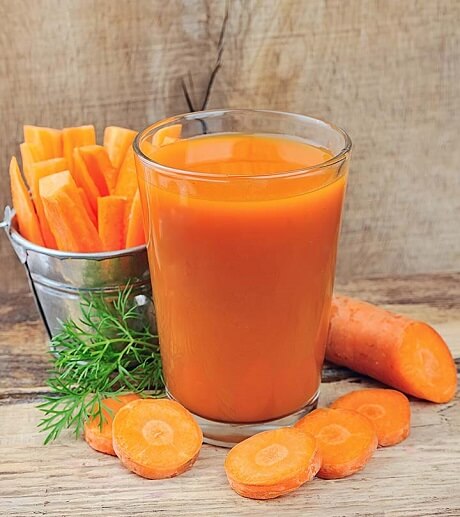Carrot juice offers an array of excellent nutrition benefits, such as Vitamin A (which is beneficial for healthy vision), Vitamin C, and other essential minerals. Compared to other fruit juices, carrot juice is low in sugar and high in antioxidants – making it a fantastic choice as part of a healthy diet.
However, too much of anything can be bad, and this is also true for carrot juice. Excessive consumption over time can lead to complications like the “carotenemia” condition (a harmless but potentially disfiguring skin yellowing) or long-term toxicity from an overload of vitamin A.
Therefore, moderation is key when drinking carrot juice in order to get the nutrition without the possible health risks. So let’s us discover that “How much should you drink carrot juice?”
Table of Contents
Introduction to Carrot Juice
Carrots are an excellent source of vitamins, minerals, and antioxidants. When juiced, carrots can help promote a healthy immune system, improve cardiovascular health, and support eye health.
However, it’s important to consume carrot juice in moderation. While carrot juice is generally safe to consume, drinking too much could lead to adverse effects such as nausea or diarrhea.

The nutrients found in carrots make them a superfood that offers numerous health benefits. Carrot juice is a great way to get your daily dose of vitamins and minerals, but it’s important to consume it in moderation. Too much carrot juice could lead to adverse effects like nausea or diarrhea. So how much is too much?
For most people, consuming up to 8 ounces of carrot juice per day is considered safe. If you’re pregnant or breastfeeding, limit your intake to no more than 4 ounces per day.
And if you have any medical conditions or take medication that could interact with carrots, it’s best to check with your healthcare provider before incorporating carrot juice into your diet.
Overall, carrot juice is a great way to increase your intake of important vitamins and minerals. With proper moderation, the health benefits of carrot juice can be reaped safely and effectively.
Read more: How Many Carrots In A Cup? Find The True Equivalents Here
Benefits of Carrot Juice
Carrot juice is full of vitamins and minerals that can boost your health. Here are some of the most impressive benefits of carrot juice:
Carrot juice can improve your eye health
The beta-carotene in carrot juice can help to protect your eyes from age-related macular degeneration and cataracts. Beta-carotene is converted into vitamin A in the body, which is essential for good vision.
Carrot juice can boost your immune system
Vitamin C is a well-known immune booster, and carrots are packed with this nutrient. Drinking carrot juice regularly can help to keep your immune system strong and reduce your risk of getting sick.
Carrot juice can improve your skin health
Due to its high vitamin A content, drinking carrot juice can help to keep your skin healthy and improve your complexion. Vitamin A is necessary for cell growth and repair, so it helps to keep your skin looking youthful and radiant. It also has anti-inflammatory properties that can help to treat acne breakouts.
Carrot juice can help to lower cholesterol
Carrots contain a special type of carbohydrate called pectin, which helps to flush cholesterol out of your body. A study published in the journal PLOS One found that participants who drank carrot juice daily for 8 weeks had a significant decrease in their levels of unhealthy LDL-cholesterol.
How Much Carrot Juice is Too Much?
Carrot juice is packed with nutrients like vitamin A, potassium, and fiber. But how much carrot juice is too much?
The answer depends on a few factors, like your age, weight, and overall health. Here’s what you need to know about safe carrot juice consumption.
How Much Carrot Juice Should You Drink?
The recommended daily intake of vitamin A is 900 micrograms for adults. Just one cup of carrot juice contains about 4 times that amount!
So, if you’re drinking more than one cup of carrot juice per day, you may be getting too much vitamin A.
Certain medical conditions can also affect how much carrot juice is safe for you to drink.
For example, if you have liver disease, you may need to limit your intake of vitamin A. And if you’re pregnant or breastfeeding, it’s important to speak with your doctor before upping your carrot juice consumption.
Generally speaking, moderation is key when it comes to consuming any type of food or beverage – including carrot juice.
If you want to enjoy the benefits of this nutrient-rich drink without overdoing it, aim for 1-2 cups per day. And make sure to pair it with other healthy foods as part of a well-rounded diet!
Bottom Line: Just one cup of carrot juice contains a lot of vitamin A, so it’s important to keep your intake in check. In general, aim for 1-2 cups of carrot juice per day as part of a balanced diet.
Possible Side Effects of Over consumption
Carrots are an excellent source of Vitamin A and other nutrients, but like all foods, they can have side effects if you consume too much. Carrot juice is especially concentrated, so it’s important to be aware of the potential side effects of overconsumption.
The most common side effect of consuming too many carrots is carotenemia, which is a yellowing of the skin. This is harmless and usually goes away on its own once you reduce your carrot intake.
However, in rare cases, carotenemia can lead to more serious problems such as liver damage.
Other possible side effects of too much carrot juice include stomach pain, constipation, diarrhea, and gas. If you experience any of these side effects after drinking carrot juice, stop consuming it and see a doctor if necessary.
In general, it’s safe to drink up to two cups (16 ounces) of carrot juice per day. If you’re concerned about the potential side effects of overconsumption, talk to your doctor or a registered dietitian before increasing your intake.
Lastly, make sure to drink carrot juice in moderation and incorporate other vegetables into your diet as well.
Recipes
When it comes to carrot juice, there is some debate on how much is too much. Some experts say that adults should consume no more than four ounces of carrot juice per day.
Others believe that up to eight ounces per day is perfectly safe. To err on the side of caution, most health professionals recommend limiting your intake to four ounces or less per day.
If you’re looking for recipes that use carrot juice as a main ingredient, there are plenty of options out there. Here are a few of our favorites:
Carrot Cake Smoothie
This delicious smoothie combines carrot juice, almond milk, banana, and spices for a tasty treat that’s perfect for breakfast or a snack.

Orange-Carrot Juice
This refreshing juice is made with fresh carrots, oranges, and ginger. It’s great for an afternoon pick-me-up or post-workout drink.
Spiced Carrot Soup

This hearty soup gets its flavor from carrot juice, cinnamon, and other warming spices. It’s the perfect comfort food for a chilly day.
Carrot-Ginger Juice
This simple juice combines carrots and fresh ginger for a sweet and spicy beverage that’s surprisingly refreshing.
No matter which recipe you try, or whether you use the best juicer machine for beginners or a simple blender to prepare your juice, the you’re sure to find one that suits your taste
Alternatives to Carrot Juice
While carrot juice is generally considered safe, there are some alternative beverages you can enjoy if you’re looking to cut back on your intake.
Water is always a good choice, and you can also try unsweetened green or herbal teas. For a fruity option, try squeezing fresh lemon or lime juice into sparkling water. If you’re craving something sweet, opt for 100% fruit juice instead of sugary drinks.
Other non-juice beverage sources of vitamin A include skim milk and fortified soy milk, fortified orange juice, and fat-free/low-fat yogurt. Additionally, as carrots are a good source of fiber, you can also try to incorporate other fiber-rich whole foods in your diet such as fruits and vegetables.
FAQs
Can too much carrot juice be bad?
Carrot juice is packed with nutrients like vitamin A, potassium, and fiber, making it a great choice for a healthy beverage. However, like anything else, too much of a good thing can be harmful. Drinking too much carrot juice can lead to elevated levels of carotene in the blood, which can cause yellowing of the skin and eyes (carotenemia).
In severe cases, carotenemia can lead to difficulty breathing and an enlarged liver. If you notice these symptoms after drinking carrot juice, it’s best to cut back on your intake or stop drinking it altogether. Carrot juice is still a healthy choice when consumed in moderation, so there’s no need to worry if you enjoy the occasional glass.
Can we drink carrot juice everyday?
If you’re like most people, you probably grew up thinking that carrots were nothing more than a healthy snack. But did you know that carrots are actually packed with nutrients that can help your body in a variety of ways? One of those ways is by providing a boost to your immune system.
The antioxidants in carrots can help to protect your cells from damage, and the vitamin A in carrots is essential for maintaining good vision and healthy skin. Carrots are also a good source of fiber, which can help to keep your digestive system running smoothly.
So, how much carrot juice is too much? The answer may surprise you. While it’s perfectly safe to drink carrot juice every day, you should limit yourself to no more than four ounces per day. That’s about half a cup.
Why the limit? Well, too much of anything is usually not a good idea. And while the nutrients in carrot juice are beneficial, they can also be somewhat hard on your digestive system if you drink too much. So it’s best to stick to the recommended amount and enjoy all the benefits that carrot juice has to offer without overdoing it.
When is the best time to drink carrot juice?
There’s no definitive answer to this question, but some experts recommend drinking carrot juice first thing in the morning on an empty stomach. This gives your body time to absorb all of the nutrients from the juice before eating or drinking anything else. If you have trouble digesting carrots, you may want to try drinking the juice with a meal instead.
Is carrot juice good for your kidneys?
Carrot juice is high in potassium and low in sodium, making it an ideal drink for people with kidney problems. It helps to promote urine production and can also help to reduce the risk of kidney stones. However, carrot juice should be consumed in moderation as it can also have a diuretic effect, which can lead to dehydration.
Who should not drink carrot juice?
Many people believe that carrot juice is a health elixir, packed with vitamins and minerals. However, like any food or drink, too much carrot juice can be unhealthy. Here are some groups of people who should not drink carrot juice:
- People with diabetes: Carrot juice is high in natural sugars, which can raise blood sugar levels.
- People with kidney problems: Carrot juice is high in potassium, which can be harmful for people with kidney problems.
- People with gastrointestinal issues: Carrot juice is a high fiber food, which can aggravate gastrointestinal issues like diarrhea and constipation.
- Pregnant women: While carrot juice is generally considered safe for pregnant women, it is best to avoid it in large quantities as it contains beta-carotene, which can convert to vitamin A in the body and potentially lead to birth defects.
Conclusion
Carrot juice is one of the most healthful drinks on the planet and can be enjoyed by everyone, including those who can’t consume other fruits or vegetables. But, it is important to understand that there are limits to how much of this drink you should be consuming as too much could lead to adverse effects. We hope our ultimate guide has provided you with an understanding of just how beneficial carrot juice can be and have given you a better idea as to when it’s time for a break. By following these simple guidelines, we believe that you will get the most out of your drinking habits!








